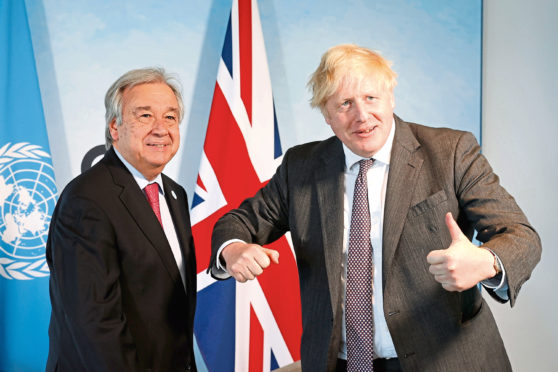
Sir David Attenborough has warned G7 leaders they face some of the most important decisions in human history as they tackle the climate change emergency.
The environmentalist and broadcaster will address the world’s richest leaders gathered in Cornwall today as they set out plans to halve their greenhouse gas emissions by 2030. Boris Johnson is also launching a £500 million “blue planet fund” to protect the world’s oceans and marine life.
Attenborough will deliver his message to the G7 at a session on climate and nature. Speaking ahead of the meeting, he said: “The natural world today is greatly diminished. That is undeniable.
“Our climate is warming fast. That is beyond doubt. Our societies and nations are unequal and that is sadly plain to see.
“But the question science forces us to address specifically in 2021 is whether, as a result of these intertwined facts, we are on the verge of destabilising the entire planet.
“If that is so, then the decisions we make this decade – in particular the decisions made by the most economically advanced nations – are the most important in human history.”
Johnson is launching the UK’s blue planet fund with £500 million to help tackle unsustainable fishing, protect and restore coastal ecosystems like mangroves and coral reefs, and reduce marine pollution. The fund will run for at least five years.
Meanwhile, G7 nations are expected to commit to almost halve their emissions by 2030, relative to 2010.
The UK has already pledged to cut emissions by at least 68% by 2030 on 1990 levels, the equivalent to a 58% reduction on 2010 levels.
The countries will set out the action they will take to slash carbon emissions, including measures like ending all unabated coal use as soon as possible, halting almost all direct government support for the fossil fuel energy sector overseas and phasing out petrol and diesel cars.
The G7 will also endorse a nature compact, aimed at halting and reversing biodiversity loss by 2030 – including supporting the global target to conserve or protect at least 30% of land and oceans by the end of the decade.
A “build back better for the world” plan will bring together G7 countries to develop an offer for high-quality financing for vital infrastructure, from railways in Africa to wind farms in Asia.
But Greenpeace UK’s executive director, John Sauven, said: “While commitments to provide more support to developing nations are absolutely vital, until they cough up the cash we are taking nothing for granted.
“The dismal track record of rich nations to honour commitments made over a decade ago on international climate finance, alongside the UK’s decision to slash its aid budget, makes it hard to take the so-called “build back better for the world’ plan with anything more than a pinch of salt.”
Thousands of protesters marched through the streets of Cornwall yesterday on the second day of the G7 summit, which is expected to cost £70 million for security.

Enjoy the convenience of having The Sunday Post delivered as a digital ePaper straight to your smartphone, tablet or computer.
Subscribe for only £5.49 a month and enjoy all the benefits of the printed paper as a digital replica.
Subscribe